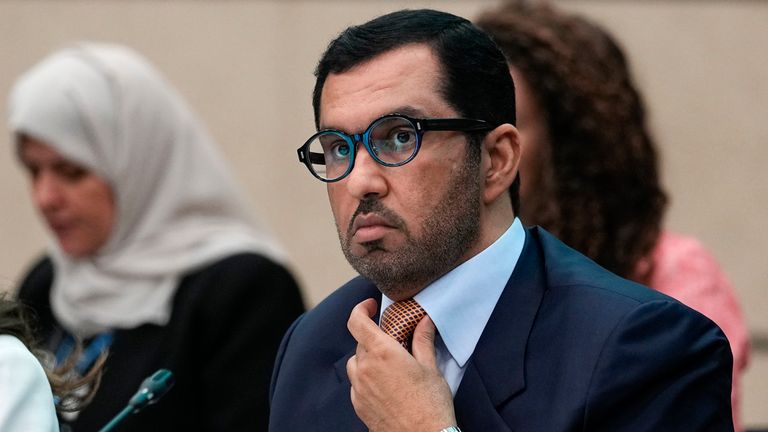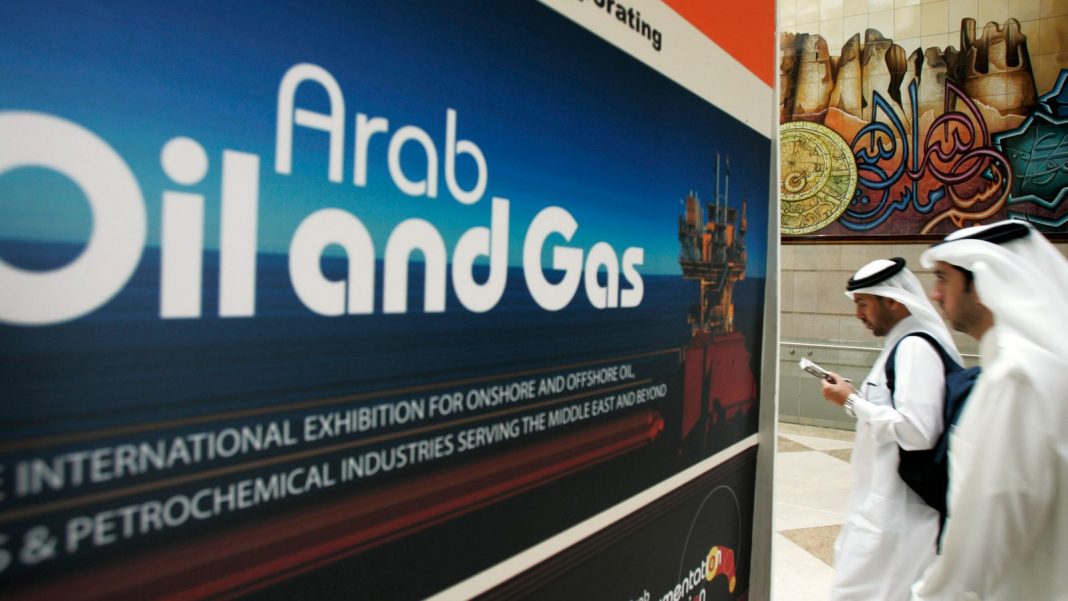The oil-rich country hosting the next UN climate summit, which this year said it was “running towards” a clean power future, missed its own green energy target, Sky News can reveal.
The United Arab Emirates, which will host COP28 in Dubai in December, pledged in 2015 to generate 24% of its electricity from clean sources by 2021.
Clean energy includes both renewable and nuclear power.
But analysis by Sky News has found that in 2021, the hot and sunny nation had only reached 11% clean power – though that figure jumped to 17.5% in 2022.
The findings are “not a good look”, said Gareth Redmond-King, international lead at energy and climate thinktank ECIU.
“It doesn’t matter how ambitious a target is if you’re not delivering against it,” he said.
“If you’re hosting COP, it’s important you’re setting up a leadership position.”
The UAE missed its target to generate 24% of its power from clean sources by 2021
COP hosts aren’t expected to be a “paragon of virtue”, he added.
COP26 host the UK has also missed climate targets, for example. But the UK “has been historically a climate leader, it has delivered huge emissions reductions,” he said.
A spokesperson for the UAE’s COP28 team said the country has set itself “ambitious targets” against which it is making “significant progress”.
They added that the UAE is “on track to meet its clean energy goals in line with its [climate action plans].”
But they said “some nuclear power” had been delayed due to the COVID pandemic and the introduction of “additional safety measures” after the Fukushima incident in 2011.
“We continue to embrace the energy transition and develop sustainable energy capacity,” they added.
Renewable power a ‘win-win solution’
The UAE, one of the world’s largest oil exporters, has also been corralling countries to ramp up renewable power in particular – things like include wind, solar and hydro.
But Sky News has found it generated just 4.5% of its power (7 TWh) from renewables last year – with the rest coming mostly from gas.
That’s much less than the 41% in the UK, 20% in Poland, Europe’s most coal dependent economy, 24% in fellow developing country Mexico and 16% in Ukraine – though far more than the 0.2% in similarly fossil fuel-rich Saudi Arabia and the middle east regional average of 2%.
“This is a fairly shockingly low figure,” said Mr Redmond-King. “But it doesn’t take account of the fact that they are using fossil fuels for lots of their transport and industry as well, separate from all of that.”
Madeleine Diouf Sarr, who chairs the negotiating group of 46 Least Developed Countries at COP talks, and leads on climate change in Senegal’s environment ministry, said: “We encourage the UAE to enhance their deployment of renewable energy as a win-win solution to decrease global warming.”
“An ambitious global target on renewable energy access is expected from COP28,” she told Sky News.
‘A line of progress’
But Dr Karen Young, a political economist focusing on the Gulf at Columbia University, said even though the UAE missed its target of 24% clean power by 2021, “17.5% is pretty close”
“We’ve seen a line of progress, an acceleration of renewable and clean capacity,” she said.
The UAE has rapidly scaled up nuclear power in recent years thanks to its vast Barakah plant – a feat that eludes many other countries like the UK – jumping from 0% of the power share in 2019 to 13% in 2022, and rising further still this year.
And although renewables only reached 4.5% in 2022, that followed a growth spurt of nearly 500% in five years, with more in the pipeline.
“It’s really hard to build nuclear power,” said Simon Harrison, group head of strategy at Mott MacDonald.
“But they’ve managed to deliver more or less on time and budget a four reactor programme, which is quite an achievement.”
Why is it hard for the UAE to ditch fossil fuels?
The UAE has a lot of gas and a lot of infrastructure to move it around.
Dr Karen Young, a political economist, said scaling up renewables much faster would mean ditching current gas infrastructure, some of which has a 30 year lifespan.
“This is the same question you’re going to find in any other country in the world, particularly in developing countries that have lots of solar resources.
“What do you do with your current power assets and how much can you really pass on to the consumer to justify the construction of a new renewable plant?”
Power generation is also “quite varied by emirate”, she added, with Abu Dhabi getting up to 80% from clean sources, and the economically weaker Sharjah and Ras Al-Khaimah further behind.
“That may be one of the obstacles in actually accelerating capacity, but also in the way that we measure it.”
The way electricity is produced in the UAE is “very largely in co-production with water,” said Simon Harrison from Mott MacDonald.
It uses the excess heat from its gas power stations to provide energy for desalination to produce fresh water – a resource it lacks.
It could not get the same heat from renewable power.
A COP28 spokesperson told Sky News the country has “designed a path to decouple the water and electricity sectors”, supported with “huge investments”.
And beyond its own shores, the UAE has “has invested $50 billion in 70 countries”, a COP28 spokesperson said.
As it prepares to host the next COP summit, when nations agree collective next steps to tackle climate change, the UAE has been rallying countries to triple renewable power capacity by 2030.

Sultan al-Jaber, who runs both UAE state-owned ADNOC oil and Masdar renewables companies, has been appointed to run the COP28 climate talks
Under particular scrutiny as the incoming COP president, the UAE has made that pledge domestically too, promising to triple its renewable power capacity to 20% by 2030.
But that still trails the global average, which has already reached 30% and is expected to rise to 43% by 2030.
Sultan Al Jaber, the senior UAE official who will run the COP talks said in July countries must be “brutally honest about the gaps” between climate targets and reality.
His dual role as head of the state-owned oil company ADNOC and renewables firm MASDAR has attracted criticism from those concerned about a conflict of interest when he also runs the COP climate talks.







